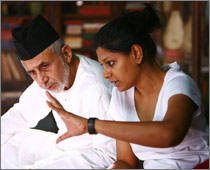Directing is a lonely process: Nandita Das
February 23, 2009

Actress turned director, Nandita Das on this new aspect of filmmaking, on the Gujarat riots, on stories and of course, on Firaaq.
“The journey of making Firaaq has been a cathartic experience that has pushed my boundaries, in more ways than one. Most films about riots are full of violence that they set out to critique. Instead, I wanted to explore the fierce and delicate emotions of fear, anxiety, prejudice and ambivalence in human relationships during such times. I have chosen an ensemble structure because there were so many stories that I had heard, seen and read, that needed to be told. When thousands have suffered, the suffering of only one cannot be glorified.
“I have enjoyed every phase of filmmaking, with all its challenges, big and small. And I am grateful to all those who had their faith in me and the story I so wanted to tell. While it is a collaborative process, it is also a lonely one. I have never had to make so many decisions, multi task at all times and be responsible for so many different things. In directing, I felt my many strands of interests came together and got subconsciously intertwined. With almost 13 years of acting experience in more than 30 films, I expected the transition to not be a difficult one, I was wrong. Making a film entailed much more than what I could have ever imagined. From an actor to a director, is like taking a quantum leap.
“During my many travels and interactions around the world, I have sensed a collective desire to understand the complex and violent world inhabit and a palpable need for peace. I hope Firaaq reflects this spirit and touches the hearts and minds of those who watch it. What compelled me to make this film is best captures in the words of Brecht, “Will there be singing in the dark times? Yes, there will be singing, of the dark times.”
I don t remember exactly when the seed of this film was sown. It had to do with waking up to newspapers filled with stories of violence. It had to do with conversations about identity and the notion of the ‘other’ that would soon turn into arguments, polarizing people instantly. It had to do with meeting many victims of violence and even some who perpetrated it. But, most of all it had to do with those who remained willfully silent. The sadness, the anger, the helplessness kept growing and a deep desire to share all those stories with a larger group of people began to take roots. In some ways it became a personal catharsis. I didn t start out looking for a story that I could direct, instead the stories compelled me to become a director.